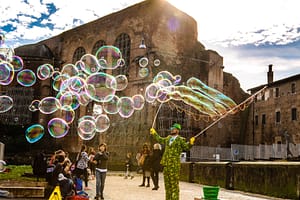The founding of Rome is enveloped in myth: the story goes that the first city center sprang up in 753 B.C. on the Palatine hill, built by Romulus after he had killed his twin brother Remus. Romulus was the first of the seven kings of Rome, who started off the basic characteristics of this city that would go on to make Rome powerful throughout the ancient world: public works, institutional reforms, aqueducts.
With the arrival of the Republic, Rome increased its expansion policy and after the Punic Wars, Carthage, Corsica and Sardinia were all annexed to the Republic. The end of the Republic determined the beginning of Silla’s dictatorship (82 B.C.)
The dictator Caius Julius Caesar oversaw a period of heavy expansion overseas. He was assassinated in 44 B.C. The Emperor Octavius Augustus brought Rome to its “golden era”: a lengthy period of peace and stability, which was celebrated with monumental works of art.
With the passing of the years, the city became increasingly Christian, while the empire fell into a fatal period of difficulty. The Pope became more and more powerful, building the grounds for the birth of the Holy Roman Empire (800 A.D.), which gave rise to the coronation of Charlemagne by the Pope. The Church’s power continued to increase and Rome became the representation of this power on earth. Between 1300 and 1600, many churches were built, beautifully painted with frescoes by Renaissance artists such as Raffaello and Michelangelo. Crowds of pilgrims flocked to the Eternal City from all over the world to admire its Baroque squares, its fountains and its monumental basilicas.
After the patriotic unrest that started in 1848 and which was headed by Garibaldi, a plebiscite approved the annexing of Rome to the Kingdom of Italy in 1870, which set up its official center in the city soon after. Starting from 1920, Rome was shaken by the terrible rise to power of Fascism that culminated in the pact made between the Italian Government and Nazi Germany. After Italy was liberated by the Allies during the Second World War, a referendum held on June 2nd 1946 sanctioned the end of the monarchy and the beginning of the Republic.
The Culture of Rome, Italy refers to the arts, high culture, language, religion, politics, libraries, cuisine, architecture and fashion in Rome, Italy. Rome was supposedly founded in 753 BC and ever since has been the capital of the Roman Empire, one of the main centres of Christianity, the home of the Roman Catholic Church and the seat of the Italian Republic.

